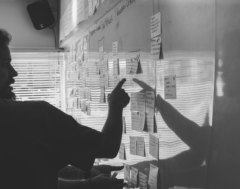
The Research-in-Practice Working Group advances SPN’s commitment to applied research by producing actionable insights that illuminate the challenges, needs, and possibilities of software preservation. Through collaborative, community-informed projects, the group generates well-documented, publicly accessible resources that strengthen both day-to-day practice and long-term planning.
Overview
The Research-in-Practice Working Group helps practitioners better understand software collections, refine workflows, and make informed decisions, while fostering collaboration across the network to tackle shared challenges and build community-driven solutions. It supports SPN’s mission through these activities:
- Conducting Applied Research: Designing and carrying out research projects that explore practical challenges in software preservation, helping inform real-world decisions and develop new approaches.
- Creating Actionable Resources: Producing well-documented, accessible tools, reports, and frameworks that institutions can use to implement or improve software preservation practices.
- Collaborating Across Communities: Partnering with peer networks, academic researchers, and cultural memory institutions to surface shared questions and co-create guidance that meets the needs of diverse practitioners.
- Identifying Gaps and Future Directions: Mapping the evolving landscape of software preservation to highlight areas that need further research, advocacy, or resource development.
- Supporting Funding and Policy Efforts: Generating high-quality research outputs that can be used to advocate for institutional support, external funding, and policy change.
Recent and upcoming projects include developing a resource on understanding and managing software collections, and co-hosting a 2025 virtual writing sprint with the Data Curation Network and Software Heritage focused on community guidance for curating and preserving software in research and memory institutions.
Whether you bring research expertise, hands-on experience, or curiosity about the evolving needs of the field, this working group offers opportunities to collaborate on projects that shape the future of software preservation through evidence, inquiry, and collective insight.
How You Might Engage
The Research-in-Practice Working Group invites both scholars and practitioners to bridge research and real-world application. If you’re curious about how research can inform software preservation—or how your work can inform research—this is a great space to explore, collaborate, and contribute. Here’s how to get involved:

Collaborate on Initiatives: Contribute your expertise to collaborative research projects that address real-world challenges in software preservation.

Bring Research into
Practice: Help translate
research findings into usable guidance, tools, or frameworks that benefit the broader preservation community.

Support Community Knowledge-Building:
Participate in discussions, writing sprints, or synthesis work that deepens the field’s collective understanding.

Identify New Directions:
Work with fellow members to shape future research priorities based on emerging needs, questions, or areas of opportunity.
If you’re passionate about turning research into actionable insight and helping define the future of software preservation, the Research-in-Practice Working Group is the place to get involved.
Resources

Supporting Software Preservation Services in Research and Memory Organizations
Abstract Supporting Software Preservation Services in Research and Memory Organizations identifies concepts, skill sets, barriers, and future directions related to software preservation work. Although definitions of “software” can vary across preservation contexts, the study found that there appears to be …Continue Supporting Software Preservation Services in Research and Memory Organizations
Reports, Resources
If you’re passionate about making software preservation more feasible and sustainable through legal and policy work, we encourage you to join the Research-in-Practice Working Group and help shape the future of this critical area.